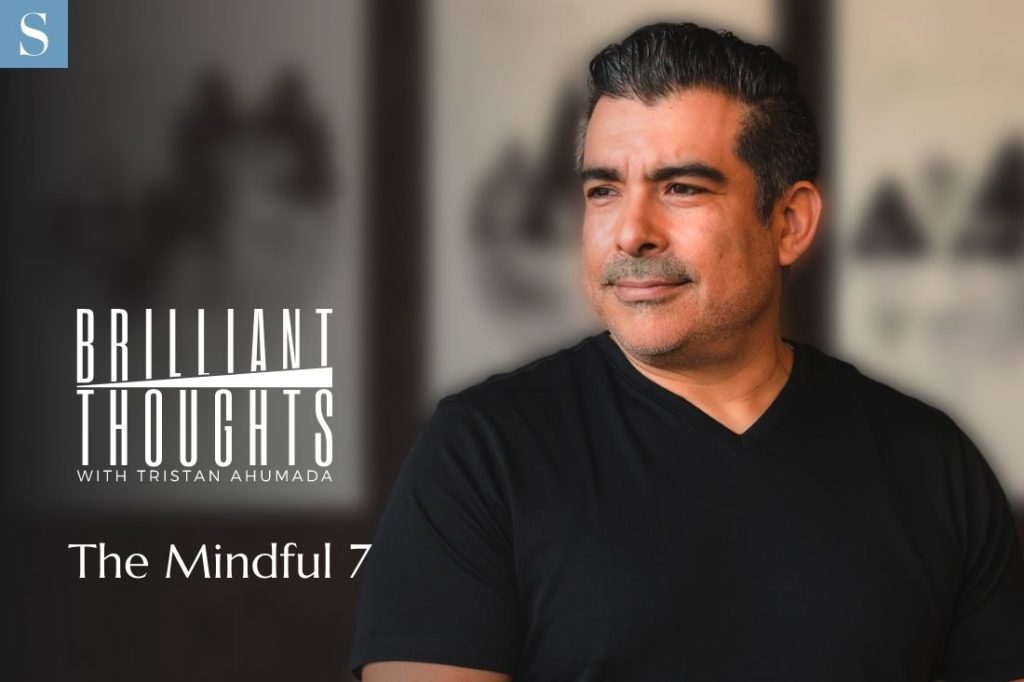How do you inspire an unmotivated son? You send him on a treasure hunt, of course! In a special solo episode, Brilliant Thoughts’ host Tristan Ahumada recounts a parable that forever changed his perspective on life, teaching him seven powerful lessons in the process.
The story centers around a very wise man who, despite his efforts, can’t seem to motivate his son to take charge of his life. The father ends up sending his son on a faux treasure hunt that takes him far away from their village. After a two-year journey the son returns home, and instead of being upset with his father for lying about the treasure, he thanks him for the many lessons and life experiences he had along the way.
The son explains that as he traveled toward the treasure, he was thrown into many new situations, expanding his awareness; however, he missed a lot of opportunities for reflection. On the journey home, he was able to be more present, able to notice the changing seasons and fellow travelers around him in a way he hadn’t before.
There’s a lot to glean from this parable, but to Ahumada, it is essentially a story about mindfulness. After reflecting on the most important takeaways, he organized them into a list of helpful suggestions called “the mindful seven.”
1. Monitor your self-talk.
Self-talk is the conversation you have with yourself, your internal monologue. It’s an important voice to be aware of because it reflects your mindset. If you’re telling yourself things like “that was stupid,” “everyone’s against me,” or “I can’t take it anymore,” you will unconsciously act those realities out in order to prove yourself right.
“It’s that self-talk, whether it’s positive or negative, that determines how we live our life and how we show up on a daily basis,” explains Ahumada. “Because what we continually tell ourselves is what we project, what we focus on.”
Family, friends and colleagues tend to know when you’re experiencing inner turmoil; they instinctively stay away. That’s because we create our lives from the inside out, so when negativity bubbles up to the surface, it’s an indication that it runs much deeper. If you want to be more mindful in general, you have to start by noticing the way you talk to yourself.
2. Think about how you use the spoken word.
The words that you use, and the tonality in which you use them, matters. Even more than self-talk, the way we approach the spoken language has a tremendous impact on the people around us. It can be used to communicate and uplift or to tear down. To Ahumada, the key is to make a habit of talking about the good things going on in your life rather than complaining by default.
“Now I’m not saying hey, look at toxic positivity where everything looks amazing,” says Ahumada. “We’re talking about you deciding what to focus on in your day.”
We all experience fear, anger and sadness—it’s part of being human. We are all subject to situations outside of our control. However, Ahumada wants us to remember that we can control how we choose to respond to those situations, as well as the things we focus on. Choosing not to dwell on things outside of your control begins to encourage the mindset of abundance.
3. Make time for daily reflection.
Intentional contemplation is the key to becoming aware of what’s really happening in your life. Making time for daily reflection will allow you to shift from a fixed mindset, which is quick to accept defeat and reject criticism, into a growth mindset, which embraces challenges and sees effort as the path to mastery. You won’t know which one you’re using unless you take time to reflect on your day.
“All it takes is five minutes at the end of the day to look back and think, ‘How did I treat people?’” says Ahumada. “And that’s where you begin to change right through that reflection, that’s key; that’s where growth happens.”
4. Always be learning and unlearning.
If you want to grow, it’s not enough to just gather new information; you need to constantly be challenging your assumptions about what you know to be true or right. To Ahumada, exposure to more people, whether in person or on the internet, is the best way to do that.
“There are so many things like this podcast, YouTube videos, audio, books that create the environment that you want to live in,” he says. “Surround yourself with those people that can help your mindset grow.”
5. Practice the things you’re afraid to do.
If there’s something you’ve been wanting to do but are afraid to get started, that’s a pretty good sign you need to be working your way up to it. Growth doesn’t arise out of comfortable, certain situations; it happens when we test ourselves, challenge perspectives and conquer fear.
Working through something uncomfortable helps challenge the limiting beliefs that are holding you back. It doesn’t happen when you just do it once, though; it’s essential to be constantly practicing whatever you’re trying to improve, whether it’s self-talk, reflection or something totally different. Just like you should always be learning and unlearning, you should always be practicing the new lessons to solidify them into habit.
6. Prioritize the big three.
Especially in Western culture, people tend to think about the mind and body as separate, almost distinct entities. Ahumada says that it’s all you—your mind, body, spirit and emotions. These aspects of personhood are actually inextricably connected and constantly affecting each other. Together, they comprise the self, which should be everyone’s number one priority.
Number two of the big three is family, which Ahumada recognizes looks different to everyone. It could be your pets, your parents, your siblings, your friends, your partner or whoever else brings goodness into your life. Part of being human is having and maintaining relationships because other people have a profound effect on your well-being.
After self and family, Ahumada says you need to be taking care of your business, whatever that looks like. It could be a side hustle, writing a book or a steady job; the type of business isn’t important, only that you make it a priority.
7. Follow a routine.
You have the power to design and implement a routine for self-betterment. Following a routine is the practice of making mindfulness a habit, and it ties the previous six together seamlessly. A disciplined routine doesn’t just create freedom, but also greater awareness, which is ultimately what mindfulness is all about: noticing thoughts, actions, feelings and sensations.
“Scientists don’t fully understand the brain, it’s so complicated, and they’re not even close to figuring it out,” says Ahumada. “The one thing they do know, though, is that you can change habits, is that you can change yourself by changing what you input.”
At the end of the day, you’re the only person in charge of your growth. The good news is that you can do it—you are totally capable of navigating your own ship, especially when you embrace the mindful seven.
Brilliant Thoughts with Tristan Ahumada is no longer releasing new episodes on the SUCCESS Podcast Network, but you can still listen to the full conversation below.





